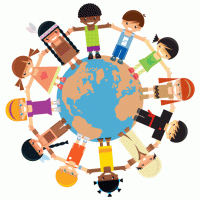Environmental Education Through Environmental Action
My grandfather Jacques-Yves Cousteau was once quoted as saying, "Before we talk about the environment, we must talk about education." It's one of my favorite quotes of his because at its root is his belief in the power of youth to change the world. It's not only a belief I share, but one that I'm confident is our best opportunity to tackle some of biggest challenges facing our planet and the world community.
Through EarthEcho International, the environmental education nonprofit organization that my sister and I co-founded in memory of our father’s work, my team and I see examples every day of youth creating real and lasting change.
Youth environmental advocate Sean Russell created the "Stow It - Don't Throw It" Project, a youth-driven marine debris prevention and ocean conservation initiative dedicated to protecting marine environments and their inhabitants, when he was a teenager in Sarasota, Florida. What started in 2008 as a local project has now grown nationally to include groups of youth and adults working to prevent fishing line entanglement of wildlife in 21 Florida counties, as well as in five other U.S. states.
Another great example is Charles Orgbon who founded Greening Forward, an environmental non-profit that is exclusively run by young people. Since 2008, Greening Forward has raised $90,000, with nearly 90% of those funds being redistributed to youth-led environmental projects around the U.S. This type of commitment and change only happens when youth have the right information and tools at their disposal.
Moving Beyond Awareness into Action
As educators, mentors and community leaders, we are in a unique position to inspire and empower today's environmental champions, and there is no better time to consider those opportunities than during Earth Month. However, we need to keep in mind certain dynamics that can mean the difference between connecting at a meaningful level and becoming lost in abstractions. For many years, the environmental movement was about creating awareness. This was a much-needed approach in a time when access to information was very different from the real-time, connected, 24/7 world in which we live today. Now, if we want things to truly change for the better, we need more from youth. Just being aware is no longer enough; our youth must act. Through the classroom, educators have unparalleled access and opportunity to help students understand their relationship to, and impact on, the planet.
The good news is that we have some amazing resources to help make these critical connections for young people and the broader audiences they influence. Social media and other technology platforms are powerful vehicles that give youth a voice and influence. Educational approaches such as service learning help incorporate the importance of hands-on experiences. Resources like these give us the ability to provide balance in the way we help young people engage with their environment. Perhaps the most important wording here is their environment. The fact of the matter is that we don't need to travel to a rainforest or see the plight of polar bears firsthand to have an impact. There are issues in every community across the United States that need our attention and action immediately, from storm water runoff polluting our waterways to toxins in our homes.
A good example of how this approach works is an initiative on which our EarthEcho team partnered with Seventh Generation Foundation and the Campaign for a Toxin-Free Generation. It features resources like downloadable information to help young people become informed about toxins in the products we use every day, and what actions we can take to reduce those toxins. Students can then share their stories of how they are helping to create a toxin-free generation by posting a short video on the campaign website.
I believe that the key to building a sustainable world comes through helping youth create change one family, one school and one community at a time. A growing chorus of young people around the world, connected with others doing the same, is creating a foundation on which we can build a brighter future for our planet.
A Way Forward
Here are some additional resources for Earth Month:
- EarthEcho's Water Planet Challenge is a service learning classroom resource for teachers and students.
- The "Stow It - Don't Throw It" Project stands as an inspiring example of a youth-created and -led organization.
- Greening Forward is another excellent example of a youth-created and -led organization.
- Teens Turning Green is a student-led environmental advocacy movement
If you're involved with or know about other groups of young people working to address environmental issues, please share in the comments section below.
